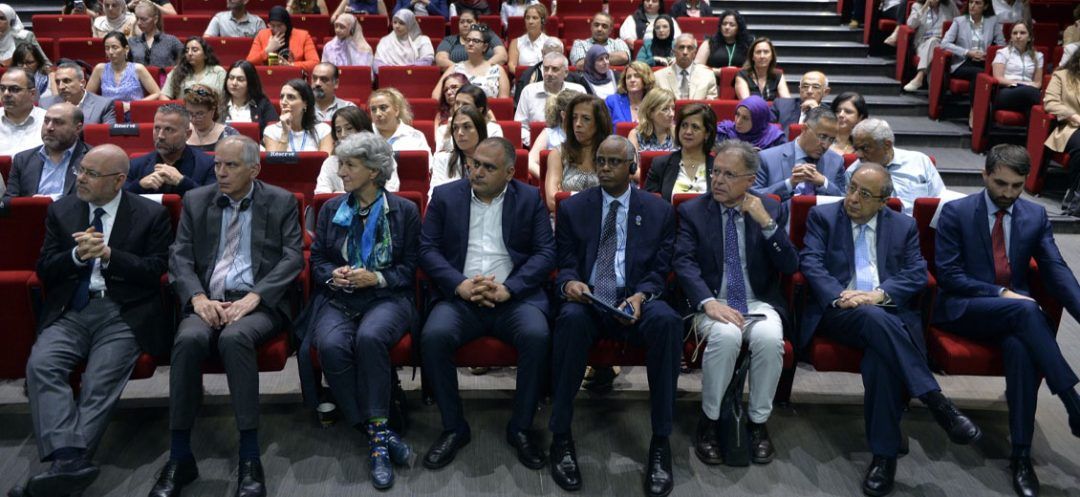
The National Mental Health Program (NMHP), in collaboration with the World Health Organization (WHO) in Lebanon and with support from the French Development Agency (AFD), officially launched Lebanon's National Mental Health Strategy for 2024-2030 on Thursday. The event was held at ESA Business School in Beirut.
The first national mental health strategy in Lebanon was launched in 2015, however, since then, the Lebanese people have experienced a series of increasingly difficult events.
Dr. Rabih Chammay, head of NMHP in Lebanon, delivered a detailed overview of the strategy and its key pillars currently in execution.
The strategy was developed with the aim of leveraging past achievements, addressing the initial strategy’s shortcomings, and prioritizing future actions where they are most critical.
However, it faces two challenges for optimal implementation. The first is financial, particularly in terms of continuity, and the second is practical, since Parliament is expected to enact the law concerning the national mental health policy.
In any event, the experiences gained from responding to emergencies such as the Syrian migrant crisis, the COVID-19 pandemic, and the Beirut Port double explosion provide valuable lessons to enhance preparedness for future emergencies, supporting mental health and psychosocial well-being.
Both are essential, given that mental health costs Lebanon $528 million annually.
Areas of Action and Objectives
The 2024-2030 program is organized into four key areas of action.
The first area focuses on strengthening leadership and governance, aiming to establish effective mechanisms and tools aligned with mental health bill. This is a crucial element of the envisaged strategy, contingent on parliamentary support and long-term funding.
The French Development Agency funds €6.4 million for patient care in secondary health facilities and reinforces community-level awareness and prevention endeavors in Lebanon. However, this amount appears inadequate to fully cover, for the moment, the implementation costs of the strategy.
According to the WHO office interviewed by This is Beirut, “While Lebanon has made progress in updating the mental health law, it has not yet been officially adopted, and securing sufficient and sustainable funding for the law implementation and the national mental health strategy remains a challenge.”
Interviewed by This is Beirut, Dr. Chammay confirms this sentiment. While the French Development Agency funding supports specific projects, it falls short of covering the entire strategy. “We need additional financing over longer, predictable periods to plan and implement the measures outlined in the strategy. We are not the sole performer but rather the conductor,” he clarifies.
According to French Development Agency’s Director, Catherine Bonnaud, interviewed by This is Beirut, the agency typically operates by providing loans. However, given the situation in Lebanon, the French State has requested it to subsidize the project instead.
“Since AFD has initiated this program, demand has been steadily increasing. This trend is not solely attributed to the current situation but also because we are successfully conveying to people that seeking treatment is not a stigma,” explains Bonnaud.
Nonetheless, AFD's allocated funding will first be directed to areas with pressing needs. This includes, in particular, enhancing local mental health services to improve their availability and accessibility in community settings, especially within public hospitals, aiming to reduce reliance on institutional care. This constitutes the program's second key focus area.
According to Catherine Bonnaud, AFD's decision to allocate funding to Beirut, Tripoli and the Beqaa region, was based on existing requests from institutions already established in these areas.
In an interview with This is Beirut, Director of Nursing at Tripoli Governmental Hospital, Roula Hajj, pointed out that the primary challenge is the unaffordability of healthcare access. She noted that at Tripoli Hospital, these services are supported by associations funded by international organizations, ensuring continuous coverage of costs.
The third area of action focuses on promotion and prevention. Its goal is to increase protective factors and promote mental health at individual, social, and structural levels, while also mitigating the impact of risk factors. One key objective is to foster changes in behavior and attitudes through national awareness campaigns.
For instance, Tripoli Governmental Hospital organizes community-level awareness and prevention training sessions. “We've noticed that these training sessions have a positive impact on the community,” emphasizes Roula Hajj. She notes that the number of cases has increased due to the economic challenges. “When individuals seek treatment, we aim to provide an average of ten therapy sessions, despite our psychotherapists being currently overwhelmed,” she explains.
The final area of action focuses on information and research. It aims to increase the availability of evidence-based knowledge in order to facilitate the implementation of mental health policies.
Another objective is to enhance program planning and transparency by regularly publishing progress reports based on available data.
The WHO office in Lebanon underscores that “one of the major challenges in Lebanon is the scarcity of mental health data, which impedes a comprehensive understanding of the scope of related issues, optimal trend tracking, and assessment of intervention effectiveness.”
Substantial Costs
In terms of figures, mental health conditions impose a significant economic burden of $528 million annually on the Lebanese economy, which amounts to 1% of GDP (2019 figures). This amount could be even higher due to the persistent economic crisis in the country since 2019.
According to a study presented at the launch, the burden of mental illnesses can be likened to an iceberg, where the visible tip represents the direct costs—specifically, the amount allocated by the government to mental health care.
In Lebanon, there is no official budget specifically designated for mental health, yet the estimated costs amount to $13 million.
In 2015, the expenditures of the Ministry of Health on these pathologies constituted 5% of its total costs.
The lower part of the iceberg represents indirect costs, such as productivity losses from absenteeism, loss of productivity, and premature deaths. These hidden costs account for the majority of expenses, primarily attributed to absenteeism.
With growing treatment access within the population, there would be a notable increase in the number of healthy life years gained between 2022 and 2042, based on this strategy.
For further information regarding the National Mental Health Strategy in Lebanon (2024-2030) and to explore available services and resources, please click here.
The first national mental health strategy in Lebanon was launched in 2015, however, since then, the Lebanese people have experienced a series of increasingly difficult events.
Dr. Rabih Chammay, head of NMHP in Lebanon, delivered a detailed overview of the strategy and its key pillars currently in execution.
The strategy was developed with the aim of leveraging past achievements, addressing the initial strategy’s shortcomings, and prioritizing future actions where they are most critical.
However, it faces two challenges for optimal implementation. The first is financial, particularly in terms of continuity, and the second is practical, since Parliament is expected to enact the law concerning the national mental health policy.
In any event, the experiences gained from responding to emergencies such as the Syrian migrant crisis, the COVID-19 pandemic, and the Beirut Port double explosion provide valuable lessons to enhance preparedness for future emergencies, supporting mental health and psychosocial well-being.
Both are essential, given that mental health costs Lebanon $528 million annually.
Areas of Action and Objectives
The 2024-2030 program is organized into four key areas of action.
The first area focuses on strengthening leadership and governance, aiming to establish effective mechanisms and tools aligned with mental health bill. This is a crucial element of the envisaged strategy, contingent on parliamentary support and long-term funding.
The French Development Agency funds €6.4 million for patient care in secondary health facilities and reinforces community-level awareness and prevention endeavors in Lebanon. However, this amount appears inadequate to fully cover, for the moment, the implementation costs of the strategy.
According to the WHO office interviewed by This is Beirut, “While Lebanon has made progress in updating the mental health law, it has not yet been officially adopted, and securing sufficient and sustainable funding for the law implementation and the national mental health strategy remains a challenge.”
Interviewed by This is Beirut, Dr. Chammay confirms this sentiment. While the French Development Agency funding supports specific projects, it falls short of covering the entire strategy. “We need additional financing over longer, predictable periods to plan and implement the measures outlined in the strategy. We are not the sole performer but rather the conductor,” he clarifies.
According to French Development Agency’s Director, Catherine Bonnaud, interviewed by This is Beirut, the agency typically operates by providing loans. However, given the situation in Lebanon, the French State has requested it to subsidize the project instead.
“Since AFD has initiated this program, demand has been steadily increasing. This trend is not solely attributed to the current situation but also because we are successfully conveying to people that seeking treatment is not a stigma,” explains Bonnaud.
Nonetheless, AFD's allocated funding will first be directed to areas with pressing needs. This includes, in particular, enhancing local mental health services to improve their availability and accessibility in community settings, especially within public hospitals, aiming to reduce reliance on institutional care. This constitutes the program's second key focus area.
According to Catherine Bonnaud, AFD's decision to allocate funding to Beirut, Tripoli and the Beqaa region, was based on existing requests from institutions already established in these areas.
In an interview with This is Beirut, Director of Nursing at Tripoli Governmental Hospital, Roula Hajj, pointed out that the primary challenge is the unaffordability of healthcare access. She noted that at Tripoli Hospital, these services are supported by associations funded by international organizations, ensuring continuous coverage of costs.
The third area of action focuses on promotion and prevention. Its goal is to increase protective factors and promote mental health at individual, social, and structural levels, while also mitigating the impact of risk factors. One key objective is to foster changes in behavior and attitudes through national awareness campaigns.
For instance, Tripoli Governmental Hospital organizes community-level awareness and prevention training sessions. “We've noticed that these training sessions have a positive impact on the community,” emphasizes Roula Hajj. She notes that the number of cases has increased due to the economic challenges. “When individuals seek treatment, we aim to provide an average of ten therapy sessions, despite our psychotherapists being currently overwhelmed,” she explains.
The final area of action focuses on information and research. It aims to increase the availability of evidence-based knowledge in order to facilitate the implementation of mental health policies.
Another objective is to enhance program planning and transparency by regularly publishing progress reports based on available data.
The WHO office in Lebanon underscores that “one of the major challenges in Lebanon is the scarcity of mental health data, which impedes a comprehensive understanding of the scope of related issues, optimal trend tracking, and assessment of intervention effectiveness.”
Substantial Costs
In terms of figures, mental health conditions impose a significant economic burden of $528 million annually on the Lebanese economy, which amounts to 1% of GDP (2019 figures). This amount could be even higher due to the persistent economic crisis in the country since 2019.
According to a study presented at the launch, the burden of mental illnesses can be likened to an iceberg, where the visible tip represents the direct costs—specifically, the amount allocated by the government to mental health care.
In Lebanon, there is no official budget specifically designated for mental health, yet the estimated costs amount to $13 million.
In 2015, the expenditures of the Ministry of Health on these pathologies constituted 5% of its total costs.
The lower part of the iceberg represents indirect costs, such as productivity losses from absenteeism, loss of productivity, and premature deaths. These hidden costs account for the majority of expenses, primarily attributed to absenteeism.
With growing treatment access within the population, there would be a notable increase in the number of healthy life years gained between 2022 and 2042, based on this strategy.
For further information regarding the National Mental Health Strategy in Lebanon (2024-2030) and to explore available services and resources, please click here.
Read more




Comments